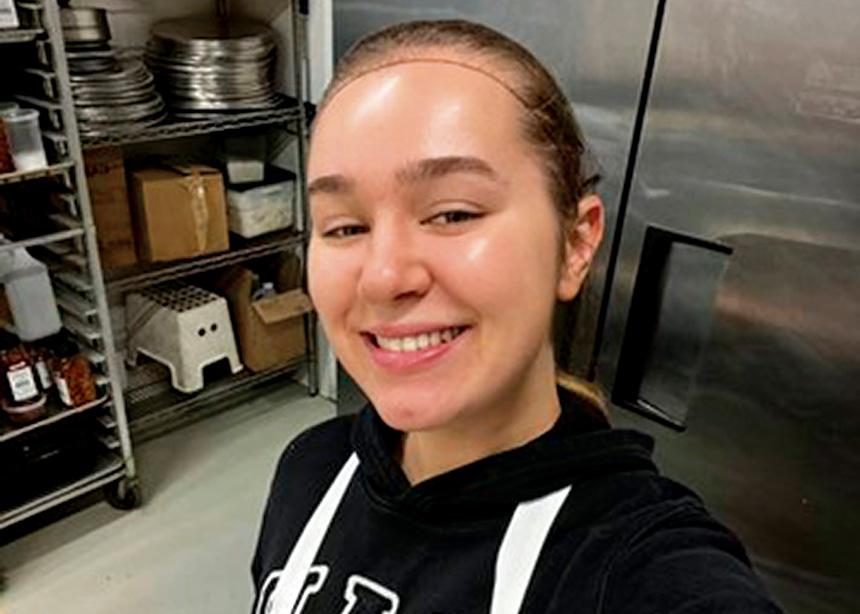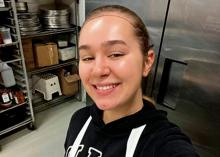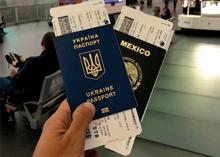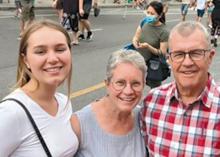When 19-year-old Anita Shevchuk found herself in the streets of downtown Toronto in the summer of 2022, she held onto her faith in God and her then-husband’s promise that everything would be okay.
They had flown to Toronto and converted their savings from pesos to Canadian dollars, which gave them little more than $800. To their surprise, immigration officials at the airport told them they were free to enter the country but did not provide them with a place to stay.
They would spend the first eight hours in the country hauling their luggage through the city streets, contacting numerous shelters, to no avail, before deciding to pause inside the Eaton Centre.
“I remember we were sitting near the Apple Store,” Shevchuk says. “I was almost crying. I was so scared.”
Two years before her arrival to Canada, Shevchuk had left her home in Zhytomyr, Ukraine, for Mexico with a plan to marry a Mexican man she had met through Instagram.
Shevchuk, the eldest of six children, shared a two-bedroom apartment with her parents and siblings for most of her life in Zhytomyr before the family settled into a larger home. She described her mother as a kind woman whom she never feared, not even when she became angry. But her father was a hard man.
He believed the first child should face harsher “discipline,” so Shevchuk’s father physically abused her. Her mom almost left him because of it.
During one beating, Shevchuk suffered two broken ribs.
“I got married so early because I wanted to escape my father,” she says.
Soon after turning 18, Shevchuk packed a suitcase with a wedding dress her mother had prepared for her and flew to Mexico, where she got married.
Two years later the couple sat in the downtown Toronto shopping centre offering prayers as they contemplated their next move. After some time, Shevchuk noticed a tall, burly security guard. He stood before the Michael Kors shop with his hands loosely tucked into the sides of his bullet-proof vest. She caught a glimpse of a tiny Ukrainian flag pinned to the side of his chest and immediately stood up to approach him.
“He told me, ‘I stand with Ukraine,’ ” recalls Shevchuk.
The security guard made several phone calls, then provided the couple with an address for a house in Toronto’s Chinatown. Although the house was terribly run down, she was grateful to have finally found a place to spend the night. She would eventually return to the mall to properly thank the guard for his help but would not find him. Employees of the Michael Kors shop told her that mall security does not typically stand where she had found him that day.
Twenty hours of lodging in Chinatown cost the couple $300. It was time to move on. They packed their belongings and headed out into a rainy Sunday morning. They pushed their suitcases down Yonge Street until coming upon Hillsong Church, where the service was about to start.
“[My husband] told me that we would stay for two services until the end, and then we would ask for help.”
Not long after the couple shared their circumstances with the congregation, Hillsong’s pastoral committee began to work on finding a place for the couple to stay. Finally, a member of the church helped them find new hosts with Mennonite farmers Bob and Sheryl Wideman in Stouffville.
“They became like my family,” says Shevchuk. “They became my friends, grandparents, parents.”
Shevchuk’s transition into her life in Canada began to pick up pace. She spent three days with the Widemans on their farm before landing a job as prep cook at Sugo, an Italian restaurant in Toronto’s west end.
“It was really interesting how God helped me to be hired,” says Shevchuk.
The manager at the restaurant was originally from Mexico and felt impressed with Shevchuk’s fluency in Spanish as well as her cooking ability. Shevchuk had picked up the language while working in the kitchen of a restaurant in Mexico, a place she says was the best school for cooking and learning Spanish.
Sugo’s manager invited her to stay at his house with his wife to reduce her commute to the restaurant.
Unlike Shevchuk, the Canadian government did not grant her husband a work permit upon arrival to the country. He took a job in construction and continued to live with the Widemans until he could afford a place for himself and his wife. In the meantime, the couple had joined Hillsong Church and formed many friendships with members there. Shevchuk’s coworkers had grown fond of her and found ways to support her at work.
Before leaving Mexico, the couple’s marriage had been marked with conflict. After settling in Canada, they had stopped fighting.
“That time it was a really happy marriage,” recalls Shevchuk. “And then something happened. Something went so wrong.”
They had moved into a comfortable studio apartment in downtown Toronto. Their fights recommenced, and Shevchuk found herself feeling afraid, heartbroken and wanting to separate. Her husband brought his brother to live with them in the small apartment. By December, she made up her mind to leave.
In the months that Shevchuk worked in Sugo’s kitchen, she had become friends with another Ukrainian newcomer. The young woman had walked into the restaurant looking for work but did not speak English. Shevchuk served as her interpreter. Though she was not hired, she and Shevchuk remained connected.
“She told me that God brought me there to find a friend in you.”
At no charge and without conditions, the young woman opened her home to Shevchuk after she left her marriage.
Two months later, Shevchuk learned that she had been approved for a U.S. visa as a Ukrainian with relatives in the United States. She moved out of her friend’s apartment, quit her job and closed her bank accounts. She was prepared for a new life in the U.S., but things took an unexpected turn when she arrived at U.S. immigration.
Because Shevchuk was married to a Mexican, she could not enter the U.S.
Shevchuk explained that she and her husband had separated and that the government had already approved her visa. The officer replied that even though the government had approved her visa, the decision to grant entry into the country rested with her. She refused Shevchuk entry.
Shevchuk began to cry. The officer said, “Don’t manipulate me; if you don’t like Canada, you can go back to Ukraine.’ ”
Shevchuk tried to understand what God was doing.
“God closed doors so loud and so painful,” she says.
“But I know that God is not done until it’s good.”
Also on her mind is her family back home. As result of nighttime bombardments, her sister suffered PTSD to the extent that she stopped eating and talking for a time. Shevchuk says her sister is now recovering, though her family still lives in fear, with recent bombs falling close enough to shake the family home.
Meanwhile, Shevchuk is settling back into life in Toronto. Before heading to the U.S., she had begun working at Rooster Coffee House in downtown Toronto. When she resumed her life in Canada, her old boss was thrilled to have her back and gave her a raise. She and her Ukrainian friend became roommates. They now share an apartment where Shevchuk’s bedroom faces the lake. The Widemans provided her with a new bed. More recently, she received an offer to work at the Royal Bank.
Ultimately, Shevchuk would like to be able to sponsor missionaries and support churches. She feels God is preparing her for this role.
“God has been blessing me so much,” she says. “My dream is not to be rich, but to be able to bless people.”






Add new comment
Canadian Mennonite invites comments and encourages constructive discussion about our content. Actual full names (first and last) are required. Comments are moderated and may be edited. They will not appear online until approved and will be posted during business hours. Some comments may be reproduced in print.